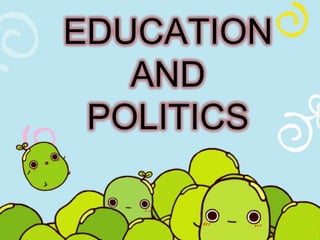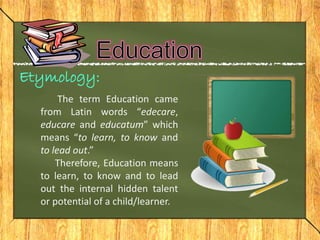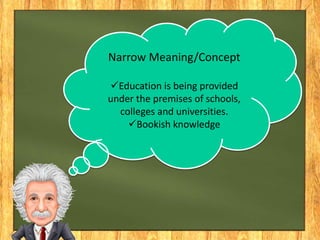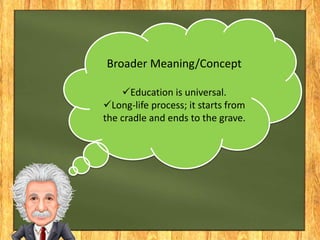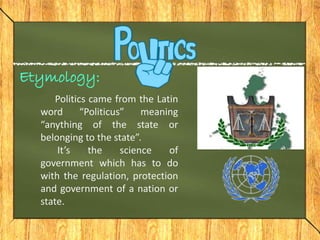1.12 education and politics tiu
- 2. Etymology and Definition Fun fact Why do we need to study Politics?
- 3. The term Education came from Latin words ŌĆ£edecare, educare and educatumŌĆØ which means ŌĆ£to learn, to know and to lead out.ŌĆØ Therefore, Education means to learn, to know and to lead out the internal hidden talent or potential of a child/learner. Etymology:
- 4. Definitions of EDUCATION ’āśProcess of receiving or giving systematic instruction especially at a school or university. ’āśThe delivery of knowledge, skills and information from teachers to students.
- 5. Did you know thatŌĆ” ’āśThereŌĆÖs a NARROW and BROADER meaning or concept of Education.
- 6. Narrow Meaning/Concept ’ā╝Education is being provided under the premises of schools, colleges and universities. ’ā╝Bookish knowledge
- 7. Broader Meaning/Concept ’ā╝Education is universal. ’ā╝Long-life process; it starts from the cradle and ends to the grave.
- 8. Politics came from the Latin word ŌĆ£PoliticusŌĆØ meaning ŌĆ£anything of the state or belonging to the stateŌĆØ. ItŌĆÖs the science of government which has to do with the regulation, protection and government of a nation or state. Etymology:
- 9. Why do we need to study Politics? Politics makes students aware of their rights and respective duties as citizens. Classes of Rights ŌĆó Natural Rights ŌĆóConstitutional Rights ŌĆóStatutory Rights
- 10. Natural Rights Right to Love Right to Life
- 11. Constitutional Rights Right of Suffrage Right to Freedom
- 12. Statutory Rights Right to inherit property
- 13. Bill of RIGHTS 1. Due process of law. 2. Rights against reasonable search & arrest. 3. Privacy of communication & correspondence. 4. Freedom of speech, expression and press. 5. Freedom of religion. 6. Liberty of abode and travel. 7. Right of Information. 8. Right to form unions and associate. 9. Power of eminent domain. 10. Obligation of contracts 11. Free access to court. 12. Right of person under custodial interrogation. 13. Right to bail. 14. Due process in criminal offenses. 15. Privilege of writ of habeas corpus. 16. Right to speedy trial. 17. Right to political belief. 18. Right against self- incrimination. 19. Right against excessive fines and management 20. Non-imprisonment for no- payment of debts and poll tax. 21. Right against double jeopardy. 22. Ex post facto law and bill of attainder.
- 14. Duties: 1. Loyalty to the Republic of the Philippines 2. Responsible exercise of rights with due regards for the right of others. 3. Defense of the state. 4. Obligation to pay taxes. 5. Obligation to register and vote.
- 15. Politics is a way of generating a more controlled society.
- 18. ŌĆ£The roots of education are bitter but the fruit is sweetŌĆØ - Aristotle

